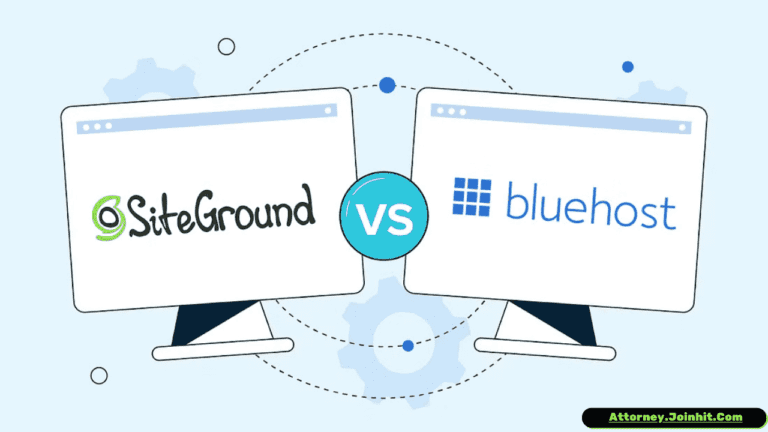SiteGround Vs GoDaddy: Which Hosting Is Better? (2024 UPDATED)
Both SiteGround vs GoDaddy, are popular and well-known names in the hosting industry. However, they can’t be completely equal, so it’s natural to compare SiteGround vs GoDaddy to learn which one is the better option for you.
SiteGround, on the other hand, has been in the web hosting game for close to two decades now.
SiteGround vs GoDaddy: Detailed Comparison
| Siteground | GoDaddy | |
|---|---|---|
| Type of Hosting Offered | Shared hosting plans, Managed WordPress hosting, and WooCommerce hosting | Shared hosting, a Business hosting plan, VPS hosting, dedicated hosting, WordPress eCommerce site hosting, and managed WordPress hosting |
| Storage | 10GB – 40GB | 30 GB – Unlimited Storage |
| Bandwidth | Unmetered bandwidth | 25k per month – Unlimited bandwidth |
| Uptime | 99.91-99.99% | 99.89-99.97% |
| Pricing | Starting at $3.99 | Starting at $5.99 |
| Customer Support Rating | 4.0/5 | 3.9/5 |
1. Performance
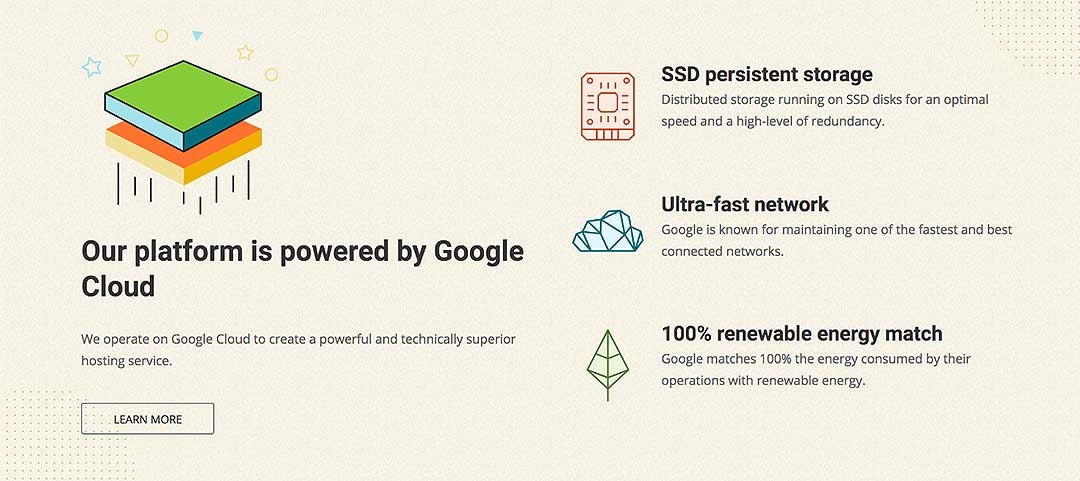
The first and most crucial factor to consider when picking web hosts is performance. There are two key elements to look at here; uptime and page loading speed.
Siteground uses ultra-fast solid-state drive (SSD) storage to optimize page load times and overall website performance. SSD storage is also available across all plans, including the cheapest options.
In addition to the SSDs, Siteground plans also come with a free content delivery network (CDN). CDN boosts site speed, ensuring users can access content quickly regardless of their location in the world.
The combination of SSDs, CDN, and other features gives Siteground incredible loading speeds. The speeds are particularly impressive in North America and Europe, where most of the servers are located.
2. Security
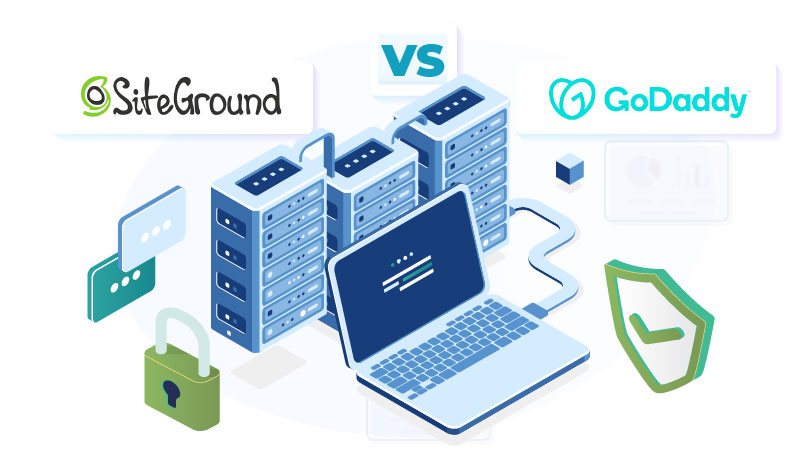
The best web hosting providers implement multiple security measures to combat vulnerabilities at the website and server level.
Siteground and GoDaddy have multiple security measures in place. They both provide free SSL certificates and daily website backup for managed dedicated hosting, for example.
Howeve GoDaddy holds back on most security measures. For instance, an SSL certificate is only available on the Ultimate and Maximum plans in web hosting.
This is a pretty basic feature that you would expect on any top web hosts. GoDaddy treats it as one of the premium features. You have to upgrade to the more expensive plans to get it or pay for it separately.
3. WordPress Integration
Siteground is one of only three web hosting companies endorsed by WordPress. The other two are BlueHost and DreamHost. That by itself speaks volumes as to how well Siteground works with WordPress.
And it’s not about integration alone. Siteground also packs plenty of features to ensure your WordPress website performs optimally. The one-click installer makes it easy to install WordPress. The platform also provides a staging area to test various features before adding them to your website.
WordPress users will enjoy managed WordPress updates, NGINX-based caching for faster page load times, a WP-CLI dashboard, etc.
GoDaddy doesn’t have the direct recommendation of WordPress, but the integration is pretty decent. WordPress users still get a 1-click install, one-click migration tools, and dozens of other features.
4. Pricing
Pricing is a crucial consideration, but you should never base your decision on prices alone. A cheap plan would mean very little if it can’t get the job done. Therefore, focus less on the actual price and more on the value you are getting for your money.
All Siteground hosting solutions start at $3.99 per month except for the cloud hosting solution.
For this price, you get one hosted website, 10GB web space, unmetered traffic, free email, free SSL certificate, out-of-the-box caching, and free website transfer using Siteground’s WP installer & migrator plugin.
No free domain, though. But, Siteground’s WordPress hosting is worth it.

Godaddy’s WordPress hosting plans start at $6.99 per month, while shared hosting starts at $5.99. Both starter plans come with additional perks, including a free domain and business email for one year. If a free domain is something you’re after, then this is the plan for you.

However, monthly traffic on WordPress hosting is capped at 25k. GoDaddy caps bandwidth in both the Basic and Deluxe web hosting plans. You can only get unlimited bandwidth with the more expensive Ultimate and Woocommerce site hosting packages.
Now, we can’t talk about web hosting pricing without discussing renewal prices. This is tricky since most providers double or even triple their prices once the honeymoon is over.
5. Reliability and Uptime
Both hosting providers guarantee a 99.9% uptime. However, Siteground edges out GoDaddy in actual uptime, with most tests showing an uptime of between 99.91 and 99.997%.
Here are some of the stats of Siteground’s hosting performance in the last ten months as provided by Pingdom[1]:
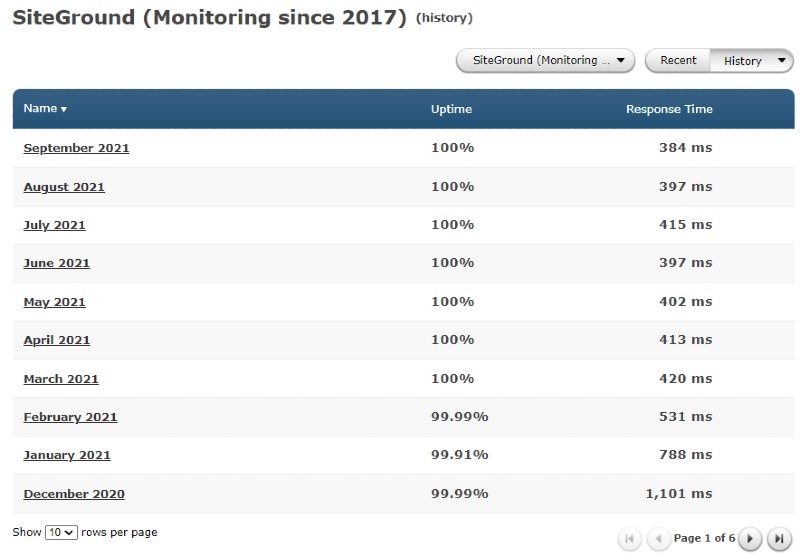
Meanwhile, GoDaddy’s uptime in the last ten months has been ranging from 99.58 to 100%. The web hosting provider recorded only one month of 100% uptime compared to Siteground’s seven consistent months.
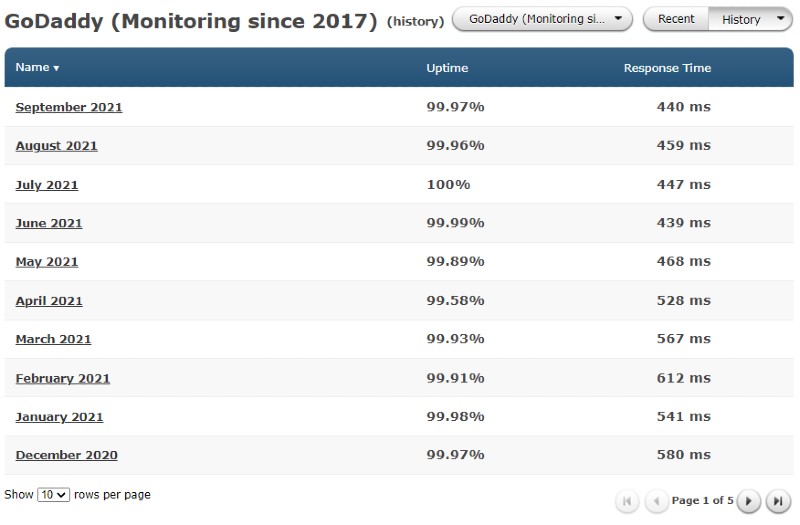
When you dig deeper into the data, you will also notice that Siteground’s lowest uptime in the last three years is 99.91% which falls well within their 99.9% guarantee.
GoDaddy’s uptimes are not as impressive as Siteground’s, but they are still within an acceptable range. But unlike Siteground, GoDaddy’s uptimes have fallen below the 99.9% guarantee not once but twice in the last nine months. Siteground beats GoDaddy here.
SiteGround vs GoDaddy: website security
SiteGround offers a much more comprehensive and robust security solution compared to GoDaddy. It’s no surprise considering that SiteGround goes in our most secure hosting providers list. The reason for that is you get access to many advanced security features for free with SiteGround.
SiteGround offers the following security features for free:
- 24/7 Network Monitoring: server status is checked every 0.5 seconds to ensure everything is working properly.
- Free SSL: every SiteGround plan comes with a free Let’s Encrypt SSL certificate.
- Automatic Daily Backups: all of your files are automatically backed up every day and stored on remote servers.
- Custom Firewall: Constantly updated rules to safeguard you and your site from emerging threats and bad actors.
- AI Anti-Bot System: automatic detection and blocking of bot traffic.
- Dedicated Security Plugin: All SiteGround plans get a dedicated security plugin to protect you from DDoS attacks, scan for malware, and automatically update plugins and themes.
Other than this, SiteGround also offers domain privacy as a paid security add-on. It costs $12 for the 1st year and $24 for renewals.
In comparison, GoDaddy offers super basic security options – features that you just can’t do without. On top of that, if you want extra security, it charges a hefty fee.
FAQs :
Why is SiteGround better?
SiteGround is one of the best web hosting services because of its high uptime guarantee of 99.9% and great speed of 311ms. All of its shared hosting plans include free SSL certificates, email accounts, native CDN, automatic backups, and built-in caching.
Is GoDaddy better than SiteGround?
Overall, SiteGround is more reliable with 99.9% uptime compared to GoDaddy’s 99.9%. It’s also faster with 872ms LCP, 1.1s Fully Loaded Time, and 217 average response time.
Who is GoDaddy best for?
GoDaddy Is Best For:
You get everything you need to get started in the low-tier plan for shared hosting, including an SSL certificate, domain name and an easy-to-use site builder. Businesses that are seeking high-quality and highly affordable VPS hosting plans.
Why is GoDaddy more expensive?
GoDaddy is expensive compared to other web hosts and domain registrars due to its branding. People recognize GoDaddy is a reliable and trustworthy provider, so they’re willing to pay top-dollar compared to a service that’s less recognizable.
Does SiteGround include WordPress?
Yes, SiteGround can host your WordPress website and all plans come with an automatic WordPress installation.

